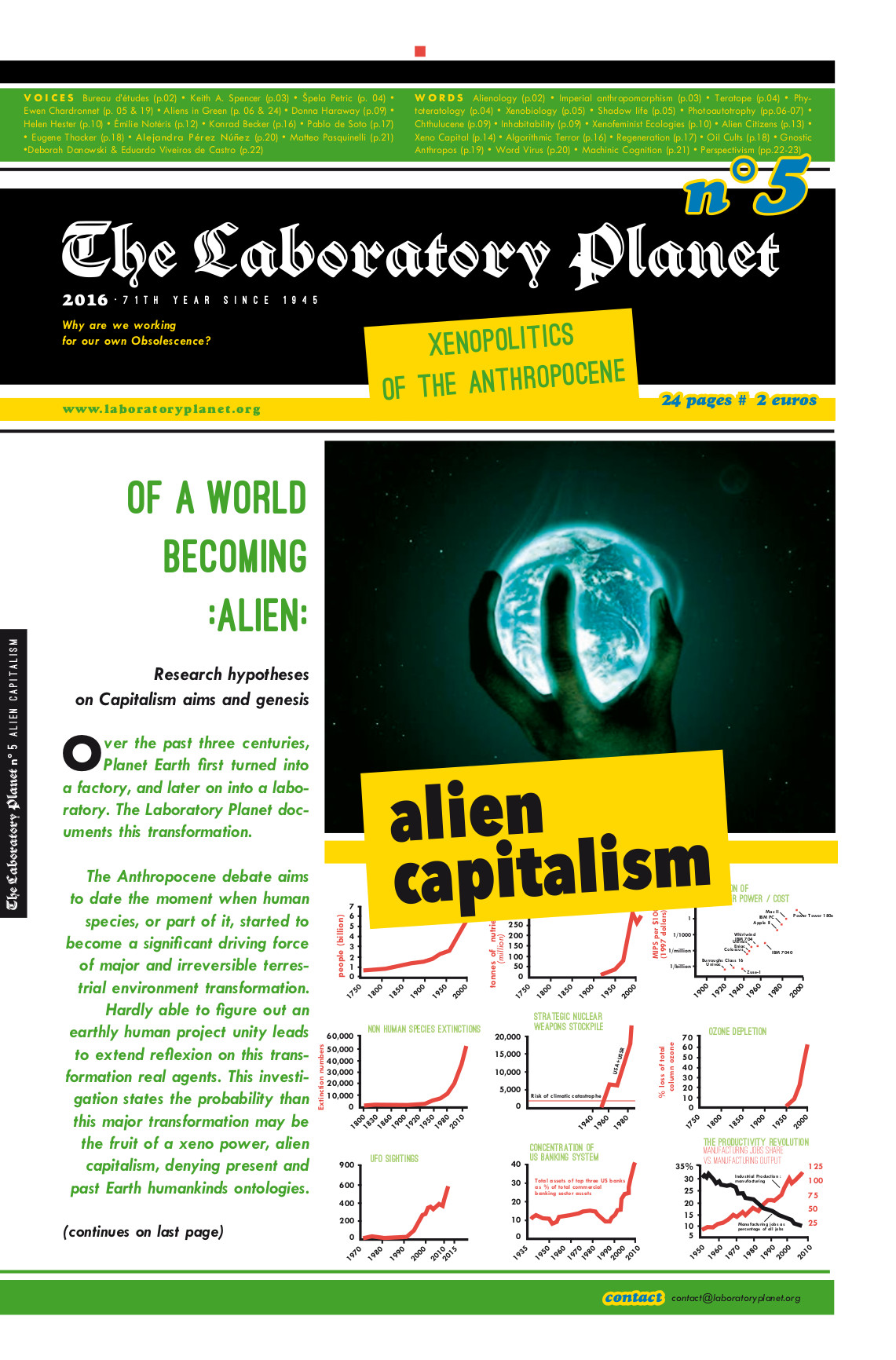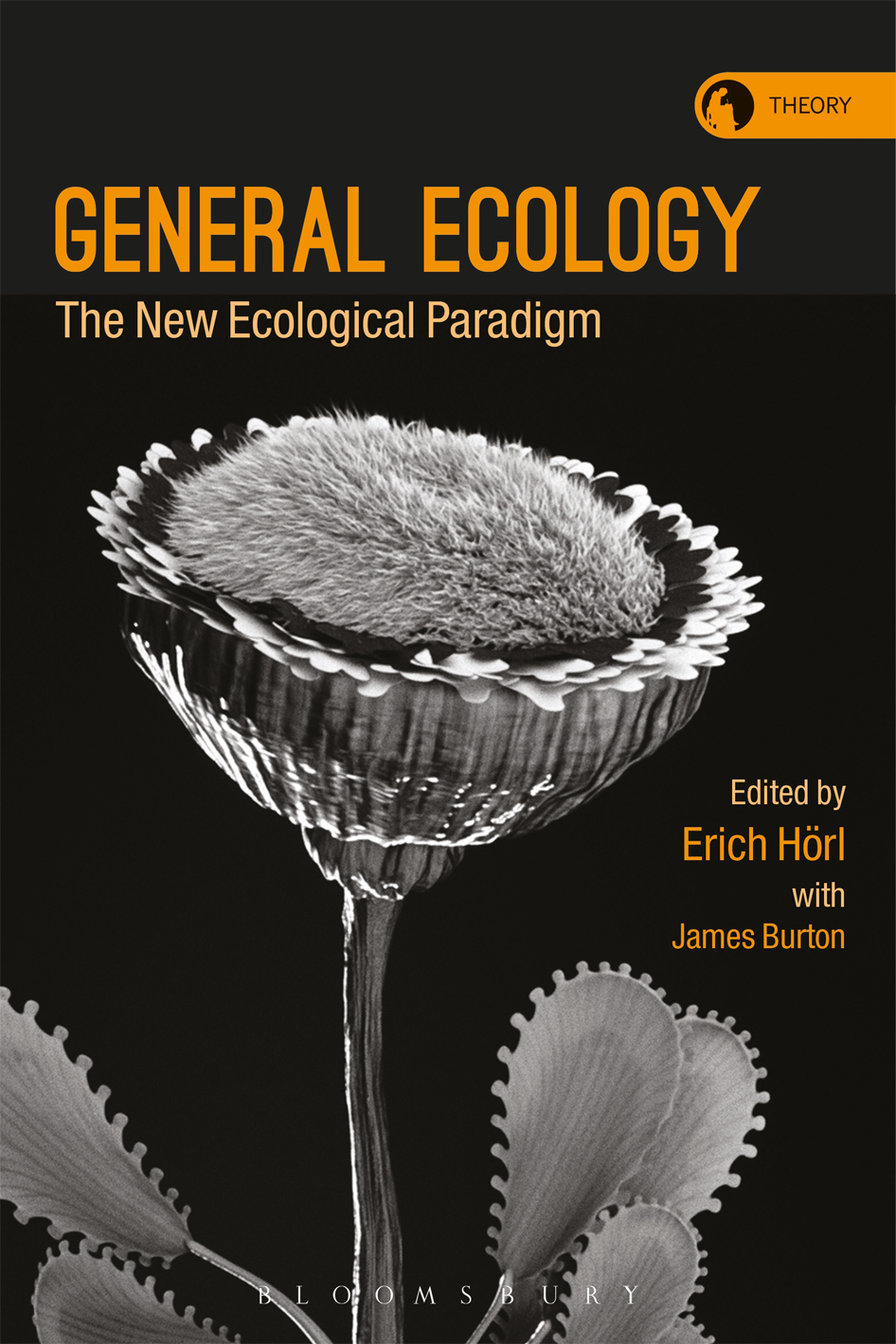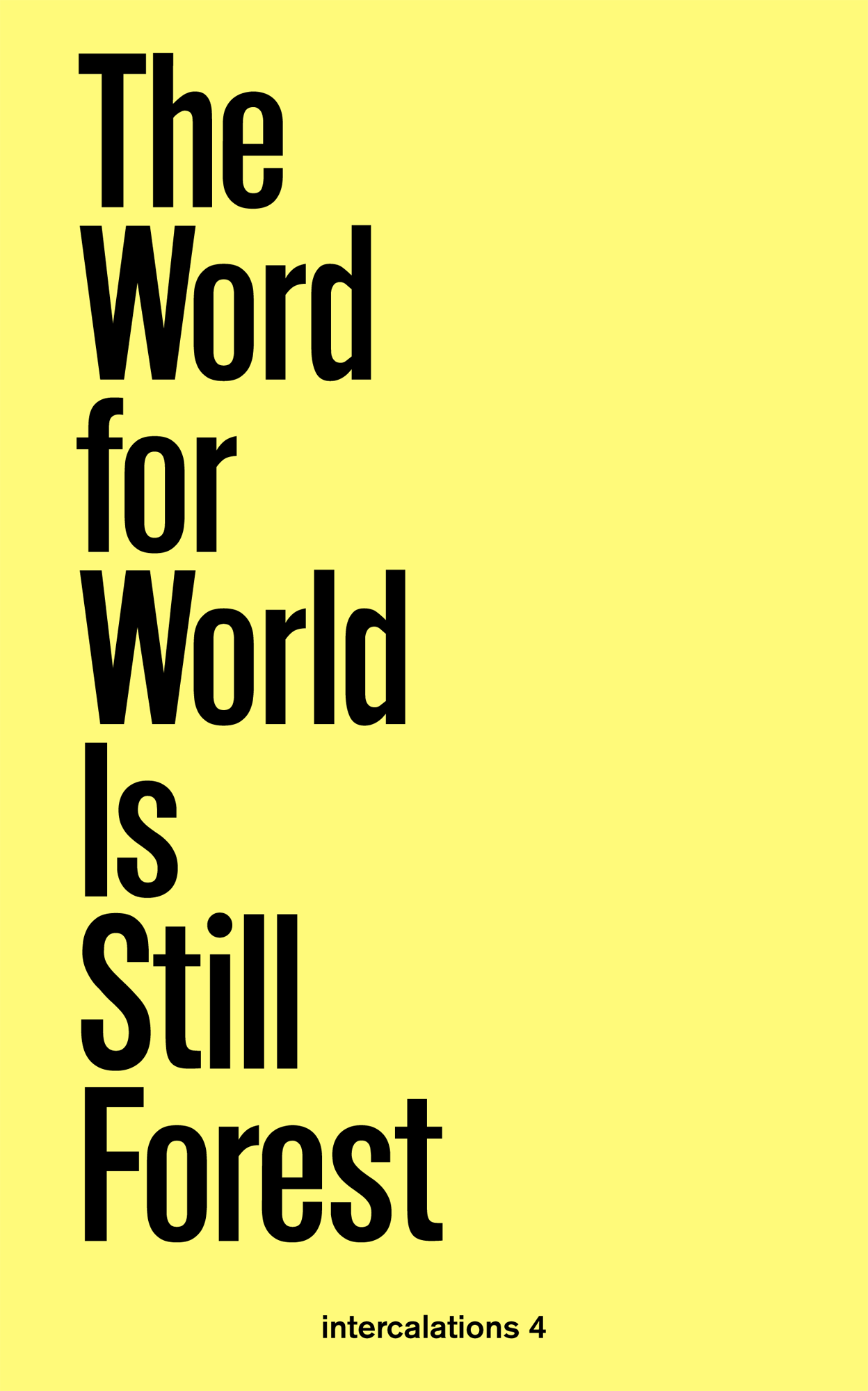The Laboratory Planet, 5: Alien Capitalism: Xenopolitics of the Anthropocene (2016) [EN, FR, ES]
Filed under book | Tags: · alien, anthropocene, art, capitalism, chthulucene, earth

“Since World War, the planet is gradually transformed into a scale 1 laboratory. The old model of “world factory” has given way to the model of the “world laboratory”. Objects of this laboratory, can we also be the subjects? Can we reclaim this huge machine that became autonomous and is now developing according to its own dynamic? Can we redirect the fate and direction of this laboratory?”
Texts by Bureau d’études, Keith A. Spencer, Spela Petric, Ewen Chardronnet, Aliens in Green, Donna Haraway, Helen Hester, Émilie Notéris, Konrad Becker, Pablo de Soto, Eugene Thacker, Alejandra Pérez Núñez, Matteo Pasquinelli, Deborah Danowski & Eduardo Viveiros de Castro.
Edited by Ewen Chardronnet and Bureau d’études
Published on 4 February 2016
24 pages
PDF, PDF (French)
PDF, PDF (English)
PDF, previous issues.
Erich Hörl, James Burton (eds.): General Ecology: The New Ecological Paradigm (2017)
Filed under book | Tags: · affect, anthropocene, biopolitics, capitalism, cybernetics, ecology, general ecology, life, nature, philosophy, systems theory, theory

“Ecology has become one of the most urgent and lively fields in both the humanities and sciences. In a dramatic widening of scope beyond its original concern with the coexistence of living organisms within a natural environment, it is now recognized that there are ecologies of mind, information, sensation, perception, power, participation, media, behavior, belonging, values, the social, the political… a thousand ecologies. This proliferation is not simply a metaphorical extension of the figurative potential of natural ecology: rather, it reflects the thoroughgoing imbrication of natural and technological elements in the constitution of the contemporary environments we inhabit, the rise of a cybernetic natural state, with its corresponding mode of power. Hence this ecology of ecologies initiates and demands that we go beyond the specificity of any particular ecology: a general thinking of ecology which may also constitute an ecological transformation of thought itself is required.
In this ambitious and radical new volume of writings, some of the most exciting contemporary thinkers in the field take on the task of revealing and theorizing the extent of the ecologization of existence as the effect of our contemporary sociotechnological condition: together, they bring out the complexity and urgency of the challenge of ecological thought-one we cannot avoid if we want to ask and indeed have a chance of affecting what forms of life, agency, modes of existence, human or otherwise, will participate-and how-in this planet’s future.”
With texts by Erich Hörl, Luciana Parisi, Frédéric Neyrat, Bernard Stiegler, Didier Debaise, Jussi Parikka, Bruce Clarke, Cary Wolfe, David Wills, James Burton, Elena Esposito, Timothy Morton, Matthew Fuller and Olga Goriunova, and Brian Massumi.
Publisher Bloomsbury Academic, London/New York, 2017
ISBN 9781350014695, 1350014699
xv+384 pages
The Word for World Is Still Forest (2017)
Filed under book | Tags: · anthropocene, botany, forest, nature, science fiction

“Taking its title from Ursula K. Le Guin’s 1972 novella, The Word for World Is Still Forest curates an homage to the forest as a turbulent, interconnected, multinature.
Moving from concepts of the forest as a thinking organism to the linear monocultural plantations that now threaten the life of global forests, the volume includes an interview with anthropologist Eduardo Kohn on perspectival multinatural semiotics based on his observations in Ecuador as well as a piece by Canadian forest ecologist Suzanne Simard, with visualizations by Kevin Beiler, examining how fungi networks uptake nutrients of salmon brought from sea to river to land by grizzlies and wolves. Curator Dan Handel presents an excerpted exhibition on “wood” as a vital element of forest mythology and the driver of industrial resource management. Media designer and data curator Yanni A. Loukissas adds a series of reflections on botanical data from Harvard University’s Arnold Arboretum.
An original typography of tree forms from artist Katie Holten’s Tree Alphabet reconnects the paper of the book page to its forest genealogy. Brazilian architect and urbanist Paulo Tavares contributes an annotated visual composition on Amazonian human rights violations and indigenous struggle, highlighting the hybrid literacies required by resistance movements fighting illegal logging and plantations. Shannon Lee Castleman also addresses illegal logging in her photo essay on the incremental harvesting practices in the diminished tropical forests of Indonesia, while the landscape architect Sandra Bartoli offers a little known history of the ancient trees of the urban forest known as the Berlin Tiergarten and Silvan Linden portrays a case study of Berlin’s ever-more controversial urban “wild.” The Nonuya elder and shaman Abel Rodríguez contributes an oral narrative of the Ancestral Tree of Plenty, transcribed in collaboration with the Tropen Bos International Colombia forest conservation group, alongside a series of his drawings of medicinal plants used for botanical conservation efforts. In resonance, the book also contains an essay by Pedro Neves Marques about the particularity of Amerindian images of naturecultures. Finally, the book includes excerpts of Ursula K. Le Guin’s original text, The Word for World Is Forest.”
With contributions by Sandra Bartoli, Shannon Lee Castleman, Dan Handel, Katie Holten, Eduardo Kohn, Ursula K. Le Guin, Silvan Linden, Yanni A. Loukissas, Abel Rodríguez, Suzanne Simard & Kevin Beiler, Paulo Tavares, and others.
Edited by Anna-Sophie Springer and Etienne Turpin
Publisher K. Verlag & Haus der Kulturen der Welt, Berlin, 2017
Intercalations series, 4
ISBN 9783981863505
xix+202 pages

